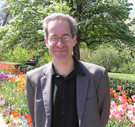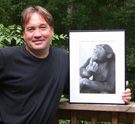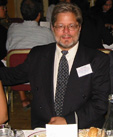2006-07 Series

September 14 2006
Massimo Pigliucci, SUNY Stonybrook
“Is Intelligent Design Science, Philosophy, or What?”
Dr. Massimo Pigliucci is Professor in the Department of Ecology and Evolution at Stony Brook University in New York. He received his Doctorate in Genetics at the University of Ferrara in Italy, his PhD in Botany from the University of Connecticut, and a PhD in Philosophy of Science at the University of Tennessee. His research focuses on plant ecological and evolutionary genetics, especially how adaptations evolve and the factors that constrain their efficacy. Dr. Pigliucci has received multiple honors and awards, including being elected as a fellow of the American Association for the Advancement of Science for “fundamental studies of genotype by environmental interactions and for public defense of evolutionary biology from pseudoscientific attack”. He has published 68 technical papers and three books on evolutionary biology: Phenotypic Evolution: a Reaction Norm Perspective (with Carl Schlichting, Sinauer, 1998); Phenotypic Plasticity: Beyond Nature and Nurture (Johns Hopkins University Press, 2001); and Phenotypic Integration: the Evolution of Complex Phenotypes (co-edited with Katherine Preston for Oxford University Press, 2004). He has also published two books for the general public: Tales of the Rational: Skeptical Essays about Nature and Science (Freethought Press, 2000), and Denying Evolution: Creationism, Scientism, and the Nature of Science (Sinauer, 2002). His latest book (with philosopher Jonathan Kaplan) is Making Sense of Evolution: Toward a Coherent Picture of Evolutionary Theory (Chicago Press, 2006). Dr. Pigliucci also maintains a website devoted to positive skepticism with links to books, lectures, essays, and a blog (www.rationallyspeaking.org).
Massimo Pigliucci, SUNY Stonybrook
“Is Intelligent Design Science, Philosophy, or What?”
Dr. Massimo Pigliucci is Professor in the Department of Ecology and Evolution at Stony Brook University in New York. He received his Doctorate in Genetics at the University of Ferrara in Italy, his PhD in Botany from the University of Connecticut, and a PhD in Philosophy of Science at the University of Tennessee. His research focuses on plant ecological and evolutionary genetics, especially how adaptations evolve and the factors that constrain their efficacy. Dr. Pigliucci has received multiple honors and awards, including being elected as a fellow of the American Association for the Advancement of Science for “fundamental studies of genotype by environmental interactions and for public defense of evolutionary biology from pseudoscientific attack”. He has published 68 technical papers and three books on evolutionary biology: Phenotypic Evolution: a Reaction Norm Perspective (with Carl Schlichting, Sinauer, 1998); Phenotypic Plasticity: Beyond Nature and Nurture (Johns Hopkins University Press, 2001); and Phenotypic Integration: the Evolution of Complex Phenotypes (co-edited with Katherine Preston for Oxford University Press, 2004). He has also published two books for the general public: Tales of the Rational: Skeptical Essays about Nature and Science (Freethought Press, 2000), and Denying Evolution: Creationism, Scientism, and the Nature of Science (Sinauer, 2002). His latest book (with philosopher Jonathan Kaplan) is Making Sense of Evolution: Toward a Coherent Picture of Evolutionary Theory (Chicago Press, 2006). Dr. Pigliucci also maintains a website devoted to positive skepticism with links to books, lectures, essays, and a blog (www.rationallyspeaking.org).

October 12 2006
William Hopkins, Agnes Scott College/Yerkes
“Evolution of Hemispheric Specialization and Language: Recent Findings from Chimpanzees”
William Hopkins is an Associate Professor of Psychology at Agnes Scott College in Atlanta, Georgia, and also holds the appointment of Research Scientist within the Division of Psychobiology at the Yerkes National Primate Research Center of Emory University. His research interests are primarily in the evolution of language and speech and how it relates to changes in the organization of the central nervous systems of primates. Of specific interest have been his studies on the evolution of hemispheric specialization (left brain, right brain functions) and language. For many years, neuropsychologists, linguists and anthropologists have argued that hemispheric specialization is unique to human evolution based on the numerous studies demonstrating that the left half of the brain is dominant for language functions, particularly among right-handed individuals. Dr. Hopkins‚ work has focused on assessing the evolutionary assumptions that hemispheric specialization is unique to humans by studying whether our closet living relative, the chimpanzee, exhibits any evidence of population-level behavioral or neuroanatomical asymmetries. Some of these evolutionary arguments have been tested by assessing handedness as well as measures of brain asymmetries using magnetic resonance imaging (MRI) in chimpanzees and other great apes including gorillas and orangutans. Studies of hemispheric specialization in great apes have shed important light on the mechanisms and evolutionary basis for language and speech in humans.
William Hopkins, Agnes Scott College/Yerkes
“Evolution of Hemispheric Specialization and Language: Recent Findings from Chimpanzees”
William Hopkins is an Associate Professor of Psychology at Agnes Scott College in Atlanta, Georgia, and also holds the appointment of Research Scientist within the Division of Psychobiology at the Yerkes National Primate Research Center of Emory University. His research interests are primarily in the evolution of language and speech and how it relates to changes in the organization of the central nervous systems of primates. Of specific interest have been his studies on the evolution of hemispheric specialization (left brain, right brain functions) and language. For many years, neuropsychologists, linguists and anthropologists have argued that hemispheric specialization is unique to human evolution based on the numerous studies demonstrating that the left half of the brain is dominant for language functions, particularly among right-handed individuals. Dr. Hopkins‚ work has focused on assessing the evolutionary assumptions that hemispheric specialization is unique to humans by studying whether our closet living relative, the chimpanzee, exhibits any evidence of population-level behavioral or neuroanatomical asymmetries. Some of these evolutionary arguments have been tested by assessing handedness as well as measures of brain asymmetries using magnetic resonance imaging (MRI) in chimpanzees and other great apes including gorillas and orangutans. Studies of hemispheric specialization in great apes have shed important light on the mechanisms and evolutionary basis for language and speech in humans.

November 2 2006
Barbara Forrest, Southeastern Louisiana University
“The Wedge Strategy: The Political Relevance of Intelligent Design Creationism.”
Barbara Forrest is the co-author with Paul R. Gross of Creationism’s Trojan Horse: The Wedge of Intelligent Design (Oxford University Press, 2004), which details the political and religious aims of the intelligent design creationist movement. She served as an expert witness for the plaintiffs in the first intelligent design legal case, Kitzmiller et al. v. Dover Area School District, which was decided in favor of the plaintiffs in December 2005. She is a member of the board of directors of the National Center for Science Education and the National Advisory Council of Americans United for Separation of Church and State. She has appeared on Larry King Live, ABC’s Nightline, and a documentary on intelligent design for the BBC Horizon series. Her radio interviews include NPR’s Science Friday with Ira Flatow and Americans United’s Culture Shocks with Barry Lynn. She is a Professor of Philosophy in the Department of History and Political Science at Southeastern Louisiana University. She is the co-recipient with cell biologist Kenneth Miller of the 2006 Public Service Award from the American Society for Cell Biology.
Barbara Forrest, Southeastern Louisiana University
“The Wedge Strategy: The Political Relevance of Intelligent Design Creationism.”
Barbara Forrest is the co-author with Paul R. Gross of Creationism’s Trojan Horse: The Wedge of Intelligent Design (Oxford University Press, 2004), which details the political and religious aims of the intelligent design creationist movement. She served as an expert witness for the plaintiffs in the first intelligent design legal case, Kitzmiller et al. v. Dover Area School District, which was decided in favor of the plaintiffs in December 2005. She is a member of the board of directors of the National Center for Science Education and the National Advisory Council of Americans United for Separation of Church and State. She has appeared on Larry King Live, ABC’s Nightline, and a documentary on intelligent design for the BBC Horizon series. Her radio interviews include NPR’s Science Friday with Ira Flatow and Americans United’s Culture Shocks with Barry Lynn. She is a Professor of Philosophy in the Department of History and Political Science at Southeastern Louisiana University. She is the co-recipient with cell biologist Kenneth Miller of the 2006 Public Service Award from the American Society for Cell Biology.

February 22 2007
Yousif Shamoo, Rice University
“Thinking Small: Evolution in a World the Size of a Coffee Pot”
Biochemist Yousif Shamoo will speak about the molecular basis of evolution – how genes encoding specific proteins change in response to changes in the environment, including insights obtained from recent experiments on real-time evolution of heat-resistant proteins in bacteria.
Dr. Shamoo is an associate professor of biochemistry and cell biology at Rice University (Houston, Texas). His research areas include structural biology, protein-RNA interactions, molecular mechanisms of cancer, and molecular evolution. Shamoo received his bachelor’s degree in biology from Carnegie-Mellon University and his doctorate in molecular biophysics and biochemistry from Yale University. Using a combination of biochemistry and structural biology (especially X-ray crystallography), his lab works on several important classes of proteins, including RNA-binding proteins involved in cellular regulation and differentiation, and DNA-binding proteins involved in replication of cellular and viral DNA. They have recently started to work on applying these techniques to molecular evolution in bacterial populations.
Yousif Shamoo, Rice University
“Thinking Small: Evolution in a World the Size of a Coffee Pot”
Biochemist Yousif Shamoo will speak about the molecular basis of evolution – how genes encoding specific proteins change in response to changes in the environment, including insights obtained from recent experiments on real-time evolution of heat-resistant proteins in bacteria.
Dr. Shamoo is an associate professor of biochemistry and cell biology at Rice University (Houston, Texas). His research areas include structural biology, protein-RNA interactions, molecular mechanisms of cancer, and molecular evolution. Shamoo received his bachelor’s degree in biology from Carnegie-Mellon University and his doctorate in molecular biophysics and biochemistry from Yale University. Using a combination of biochemistry and structural biology (especially X-ray crystallography), his lab works on several important classes of proteins, including RNA-binding proteins involved in cellular regulation and differentiation, and DNA-binding proteins involved in replication of cellular and viral DNA. They have recently started to work on applying these techniques to molecular evolution in bacterial populations.

March 22 2007
Douglas Crews, Ohio State University
“Human Senescence and Longevity: Evolutionary Theories, Biological Models, and Biocultural Influences”
Dr. Douglas Crews is a professor in the Department of Anthropology and the School of Public Health at Ohio State University. He is a physical anthropologist who focuses on studying human adaptation as demonstrated by the processes of aging, disease, and other genetic and quantitative aspects of human variation. Dr. Crews began studying these processes in Samoans in the South Pacific over a quarter of a century ago, but following the time honored pattern in anthropology, he has expanded his interests cross-culturally, to understand aging and adaptation in a variety of other populations. He is currently working with biocultural data collected from American Samoans, African Americans of central Ohio, and Yanomami and Cofan Indians of the Brazilian and Ecuadorian Amazon. He drew on much of this data collected first hand for his well-received recent book, Human Senescence: Evolutionary and Biocultural Perspectives (2004, Cambridge University Press). Dr. Crews has held many offices in national and international anthropological organizations, widely published his research, and lectured internationally on aging and adaptation. His graduate students are currently conducting research in Brazil, Ecuador, India, Cayo Santiago, and the United States, in addition to the research on molecular studies of the HLA system and candidate genes for diabetes, obesity, and blood pressure conducted in his genetics lab at Ohio State. Dr. Crews’ lecture about the evolutionarily unusual nature of human longevity and aging will be sponsored by the department of anthropology.
Douglas Crews, Ohio State University
“Human Senescence and Longevity: Evolutionary Theories, Biological Models, and Biocultural Influences”
Dr. Douglas Crews is a professor in the Department of Anthropology and the School of Public Health at Ohio State University. He is a physical anthropologist who focuses on studying human adaptation as demonstrated by the processes of aging, disease, and other genetic and quantitative aspects of human variation. Dr. Crews began studying these processes in Samoans in the South Pacific over a quarter of a century ago, but following the time honored pattern in anthropology, he has expanded his interests cross-culturally, to understand aging and adaptation in a variety of other populations. He is currently working with biocultural data collected from American Samoans, African Americans of central Ohio, and Yanomami and Cofan Indians of the Brazilian and Ecuadorian Amazon. He drew on much of this data collected first hand for his well-received recent book, Human Senescence: Evolutionary and Biocultural Perspectives (2004, Cambridge University Press). Dr. Crews has held many offices in national and international anthropological organizations, widely published his research, and lectured internationally on aging and adaptation. His graduate students are currently conducting research in Brazil, Ecuador, India, Cayo Santiago, and the United States, in addition to the research on molecular studies of the HLA system and candidate genes for diabetes, obesity, and blood pressure conducted in his genetics lab at Ohio State. Dr. Crews’ lecture about the evolutionarily unusual nature of human longevity and aging will be sponsored by the department of anthropology.

April 19 2007
Philip Gingerich, Univ Michigan
“Fossils and the Origin of Whales”
Paleontologist Philip Gingerich is a professor of geological sciences and curator of the Museum of Paleontology at the University of Michigan where he also holds faculty appointments in Anthropology and in Ecology and Evolutionary Biology.
He has done crucial research into the phylogeny and origin of whales, including the discovery and description of the earliest known whale, Pakicetus and the archaic whale Rodhocetus, as well as work on the osteology of Ambulocetus. Gingerich has also carried out extensive research into faunal turnover rates in the Cenozoic and the rate of evolutionary change which can be inferred from Cenozoic mammal lineages work, which has been pivotal in casting doubt on the validity of Gouldian punctuated equilibrium.
Gingerich has active long-term field projects in several parts of the world. Research with students and colleagues in Wyoming involves environments and evolution through the Paleocene-Eocene transition, when important groups of modern mammals appeared in the fossil record during the PETM global greenhouse warming event. His research on Eocene whales and sea cows involves colleagues in Egypt, where fossil skeletons are abundant and often virtually complete. Gingerich’s Egyptian field area, Wadi Hitan, is now a UNESCO World Heritage Site. Research with colleagues in Pakistan is focused on the origin of whales, and here Gingerich’s team was the first to find whales with skeletons linking them to artiodactyl land mammals.
Philip Gingerich, Univ Michigan
“Fossils and the Origin of Whales”
Paleontologist Philip Gingerich is a professor of geological sciences and curator of the Museum of Paleontology at the University of Michigan where he also holds faculty appointments in Anthropology and in Ecology and Evolutionary Biology.
He has done crucial research into the phylogeny and origin of whales, including the discovery and description of the earliest known whale, Pakicetus and the archaic whale Rodhocetus, as well as work on the osteology of Ambulocetus. Gingerich has also carried out extensive research into faunal turnover rates in the Cenozoic and the rate of evolutionary change which can be inferred from Cenozoic mammal lineages work, which has been pivotal in casting doubt on the validity of Gouldian punctuated equilibrium.
Gingerich has active long-term field projects in several parts of the world. Research with students and colleagues in Wyoming involves environments and evolution through the Paleocene-Eocene transition, when important groups of modern mammals appeared in the fossil record during the PETM global greenhouse warming event. His research on Eocene whales and sea cows involves colleagues in Egypt, where fossil skeletons are abundant and often virtually complete. Gingerich’s Egyptian field area, Wadi Hitan, is now a UNESCO World Heritage Site. Research with colleagues in Pakistan is focused on the origin of whales, and here Gingerich’s team was the first to find whales with skeletons linking them to artiodactyl land mammals.
